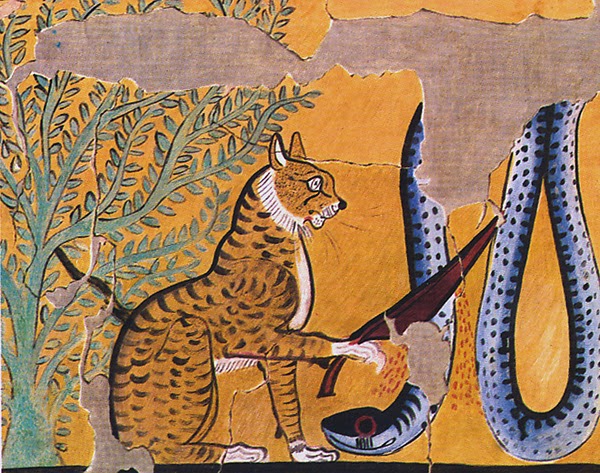Miss Cuddlywumps introduces the Egyptian sun god Ra, who, as a cat, killed a snake-demon every night
In ancient Egypt, cats were valued for their ability to kill
creatures that were potentially dangerous to humans. I am referring here to
rodents, scorpions, and snakes. And when an Egyptian god took on the form of a
cat, he could kill a demon creature far more dangerous than the flesh-and-blood
serpent it resembled. This cat was required to kill a snake that could stop the sun from rising.
 |
|
Facsimile painting
by Charles K. Wilkinson
of scene in Ramesside
tomb at Deir el-Medina
(c. 1295–1213 BC).
|
The sun god Ra was the creator of all life and the strongest
of the Egyptian gods. As the story goes, Ra journeyed across the sky each day, and
each evening, as Atum-Ra, he slipped beneath the horizon and entered the
underworld. There, in the guise of the “Great Tomcat” or Mau, Atum-Ra
confronted the evil snake-demon Apophis, who was darkness and chaos. The god
had to kill his enemy so he himself could return to the world in the morning as
the shining sun.
 |
|
Jon Bodsworth
(photographer).
[Public domain], via Wikimedia Commons.
|
The confrontation between Atum-Ra and Apophis is seen in
Egyptian tomb paintings and in the Book
of the Dead. Most depictions show the god as a cat, using a knife to cut
off the serpent’s head. Sometimes the cat is shown simultaneously crushing
Apophis’ head with one paw while decapitating him with a knife held in the other
paw.
As Jaromir Malek wrote, “These are no pussycats but strong
and powerful animals” (p. 84). He speculated that these cats were based not on
domestic cats but on wild servals.
 |
|
wall painting in tomb of Inherkha, Thebes (c. 1160 BC).
Uploaded by Eisnel at en.wikipedia.
Licensed under Public domain via Wikimedia Commons.
|
The feline creature depicted in the Theban tomb of Inherkha
(c. 1160 BC) is especially wild- and fierce-looking. It has a large, muscular
body, long ears, and a long tongue. No housecat ever looked quite like that! It
could be, as Malek said, that this is an imaginary catlike creature, designed
by the artist to be more fearsome and powerful than any existing cat.
Sources
Engels, Donald. Classical
Cats. London: Routledge, 1999.
Malek, Jaromir. The
Cat in Ancient Egypt. Revised ed. London: British Museum Press, 2006.

No comments:
Post a Comment